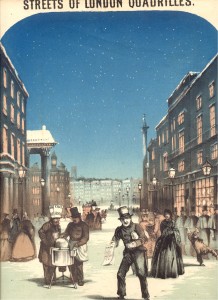Despising bankers and panic over financial crises are no new phenomenons: Dion Boucicault’s The Poor of New York (later renamed The Streets of London), written in collaboration with three journalists, was a popular success in 1857. Focusing on two periods financial panic, 1837 and 1857, the plot is set in motion by the actions of the villain Bloodgood, a banker, who absconds with his bank’s cash just before it goes bankrupt. One of the latest investors, Captain Fairweather, leaves an impoverished family who are driven further into penury as a result of Bloodgood, who, as a wealthy landlord, demands high rents from the Fairweather family and their friends.
Boucicault himself suffered from poor finances for most of his life, but as a result of overspending, rather than extortion. He was involved in several cases regarding plagiarism; The Poor of New York was closely based on Les Pauvres de Paris by Edouard-Louis-Alexandre Brisbarre and Eugene Nus. Ironically, Boucicault’s version was written in response to his desperate need for money after the birth of Eve, Dion and Agnes Boucicault’s second child.
Although initially written for and performed in America, the play was a hit elsewhere, with the name of the production changing to suit the place of its performance. The Poor of Liverpool, for example, was performed in 1864 and versions of The Streets of Dublin performed as recently as 1995. Despite the critics’ derision and Boucicault’s own admission that the play was ‘guano’, the enduring popularity of the play suggests that the trials of financial panics and the actions of bankers have long been a subject to draw the crowds.
For more information on this or any of Boucicault’s plays, have a look at the Special Collections website, where there are lists of characters, plot summaries and lists of productions of some of Boucicault’s better known productions. Archives Hub now also includes full descriptions of the two Boucicault Collections.
If you would like to view any items from the collection, please email specialcollections@kent.ac.uk to make an appointment.
With many thanks to Angela Groth-Seary for the excellent website, and to Mrs Sue Crabtree, for her research.

